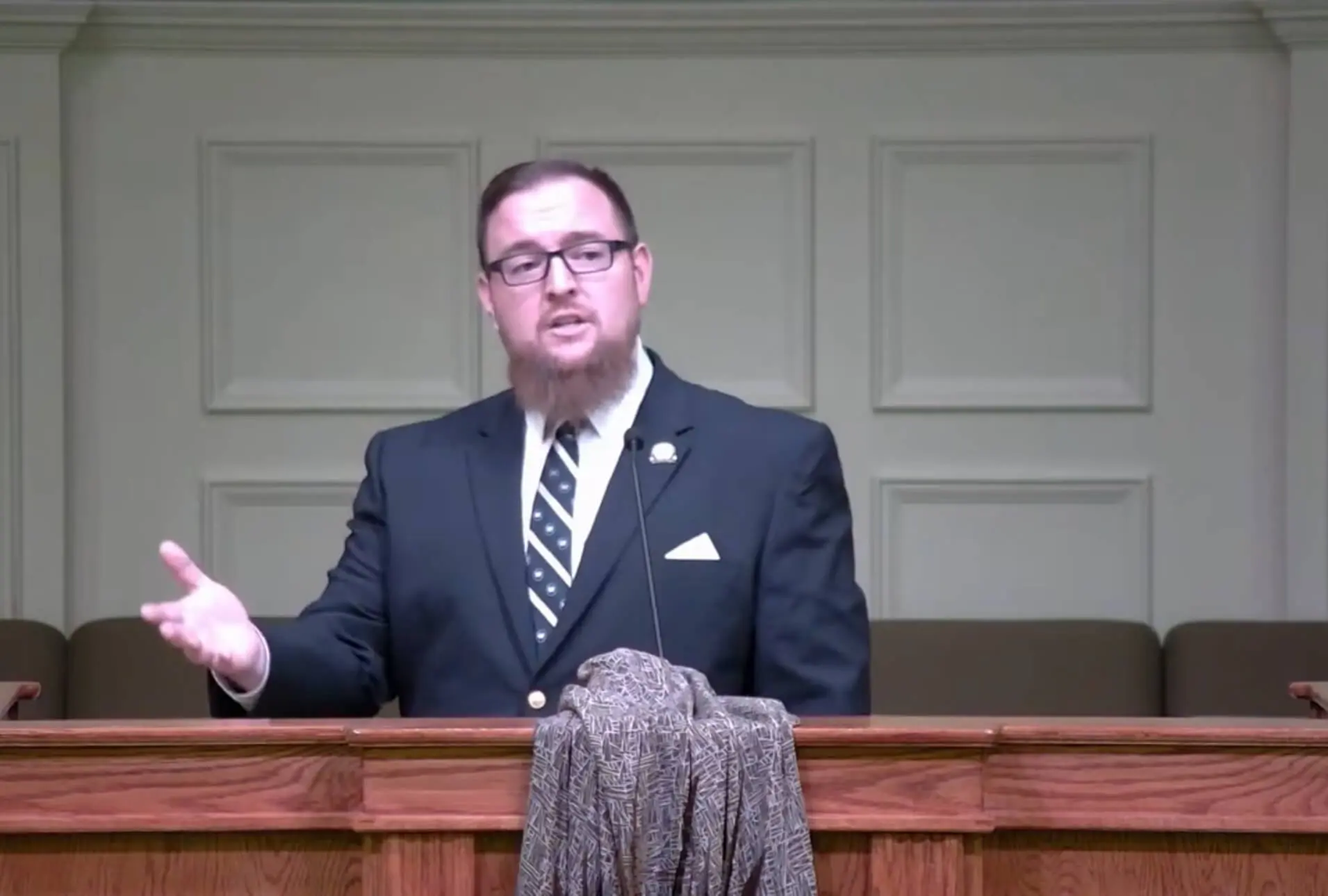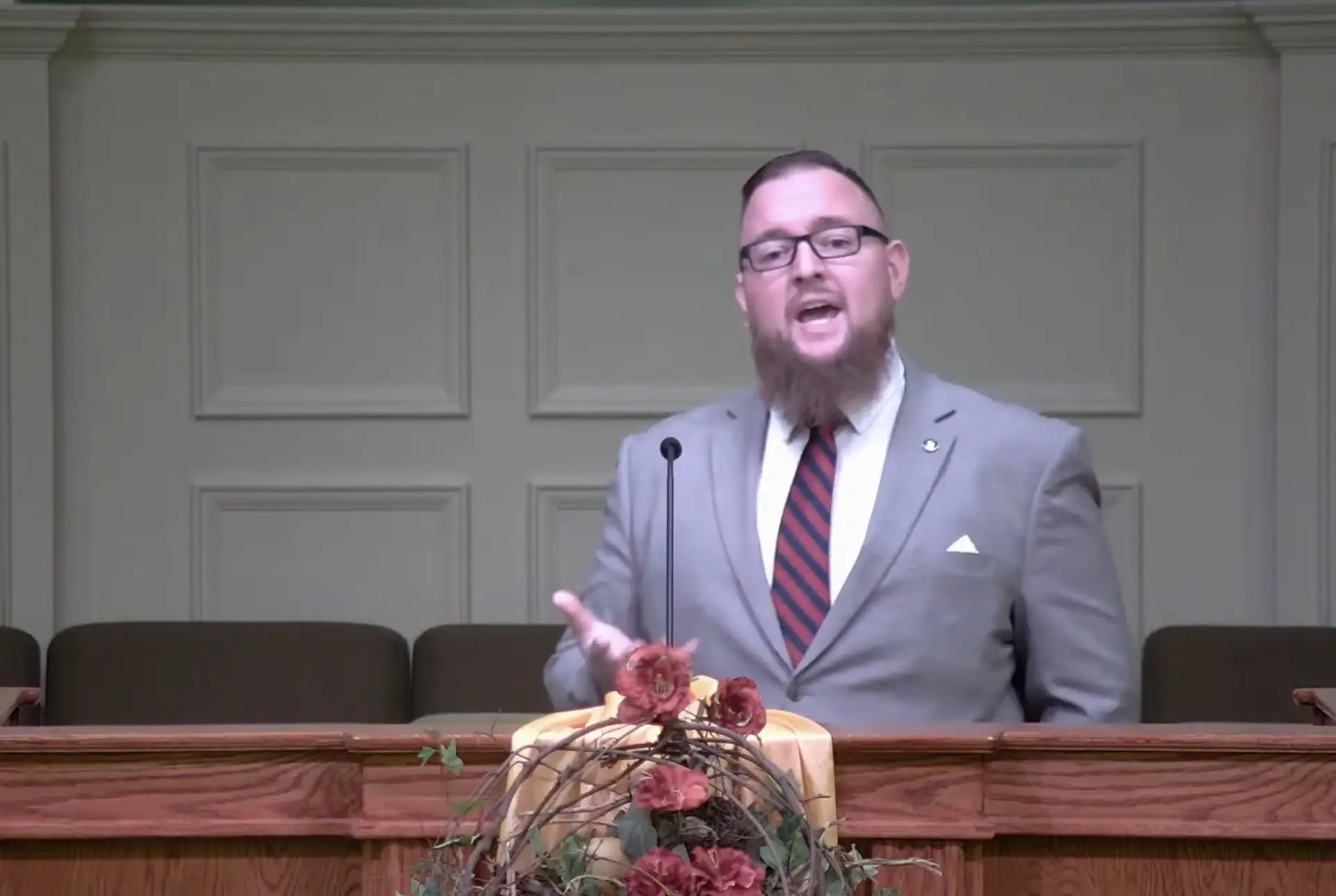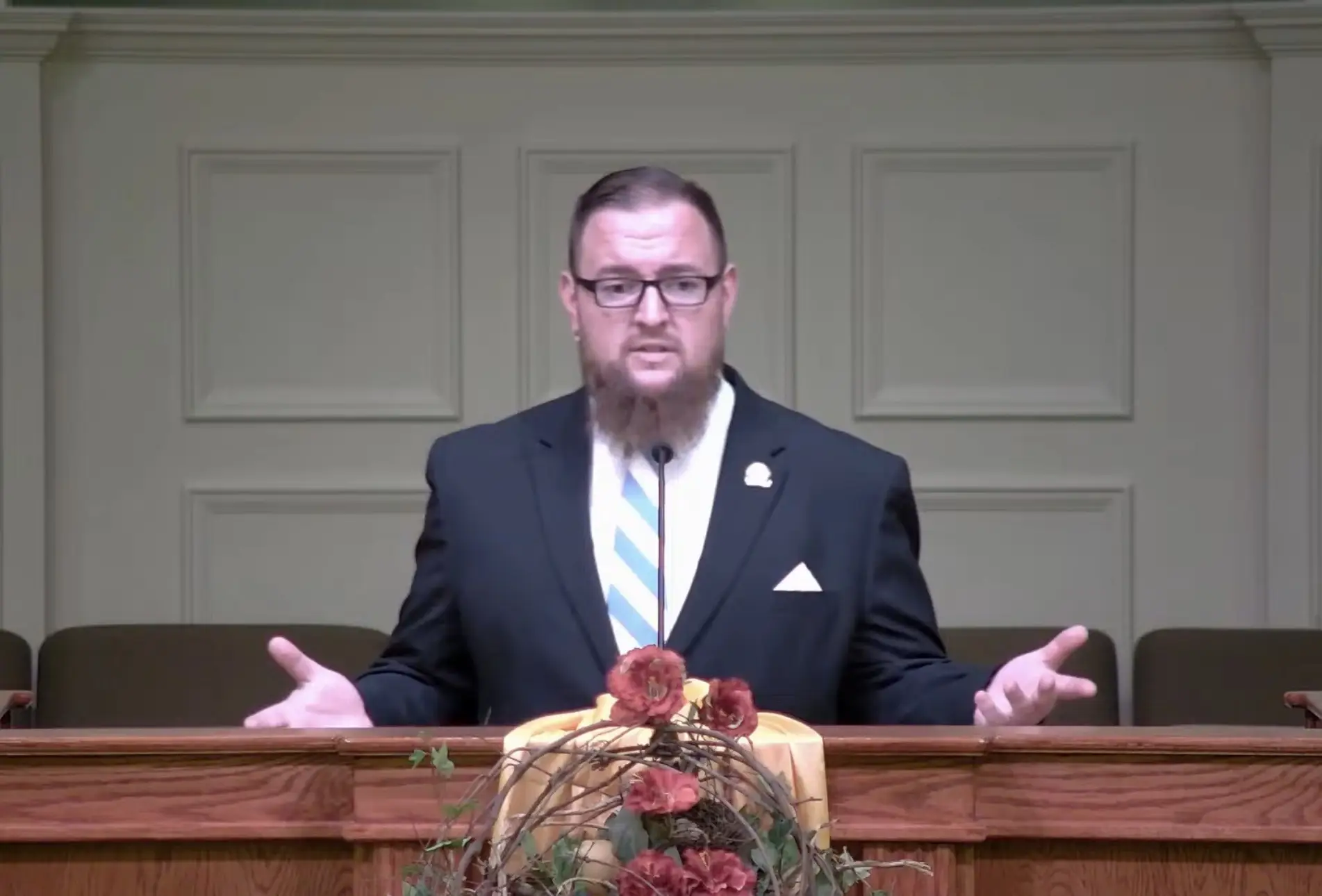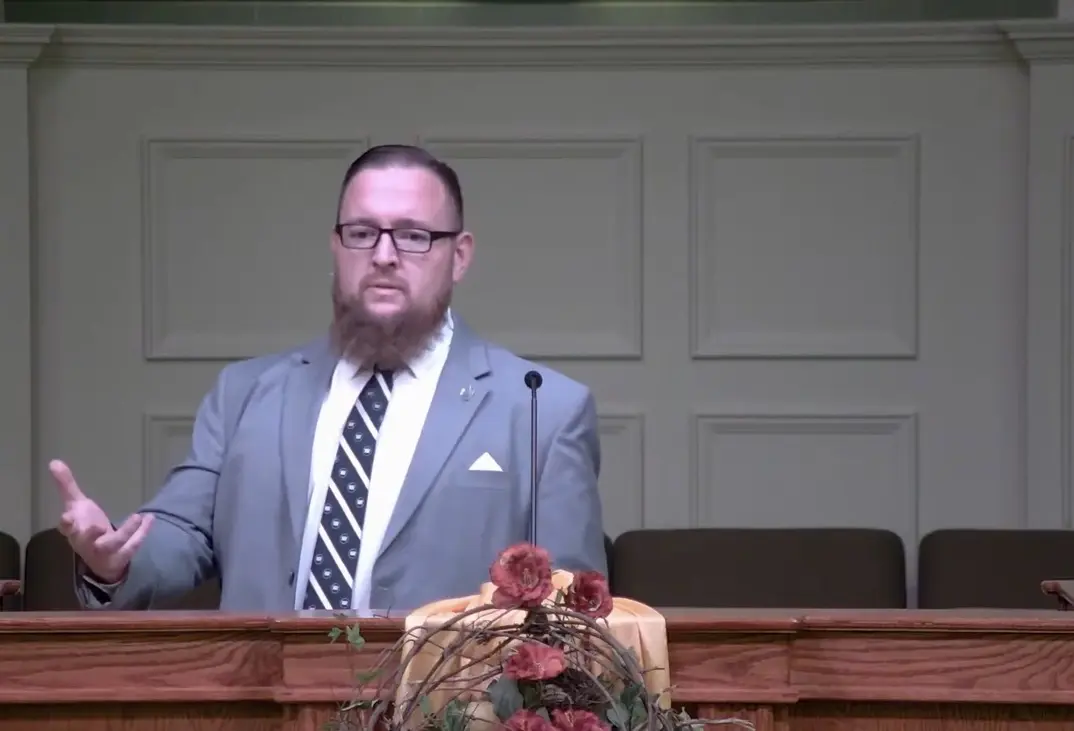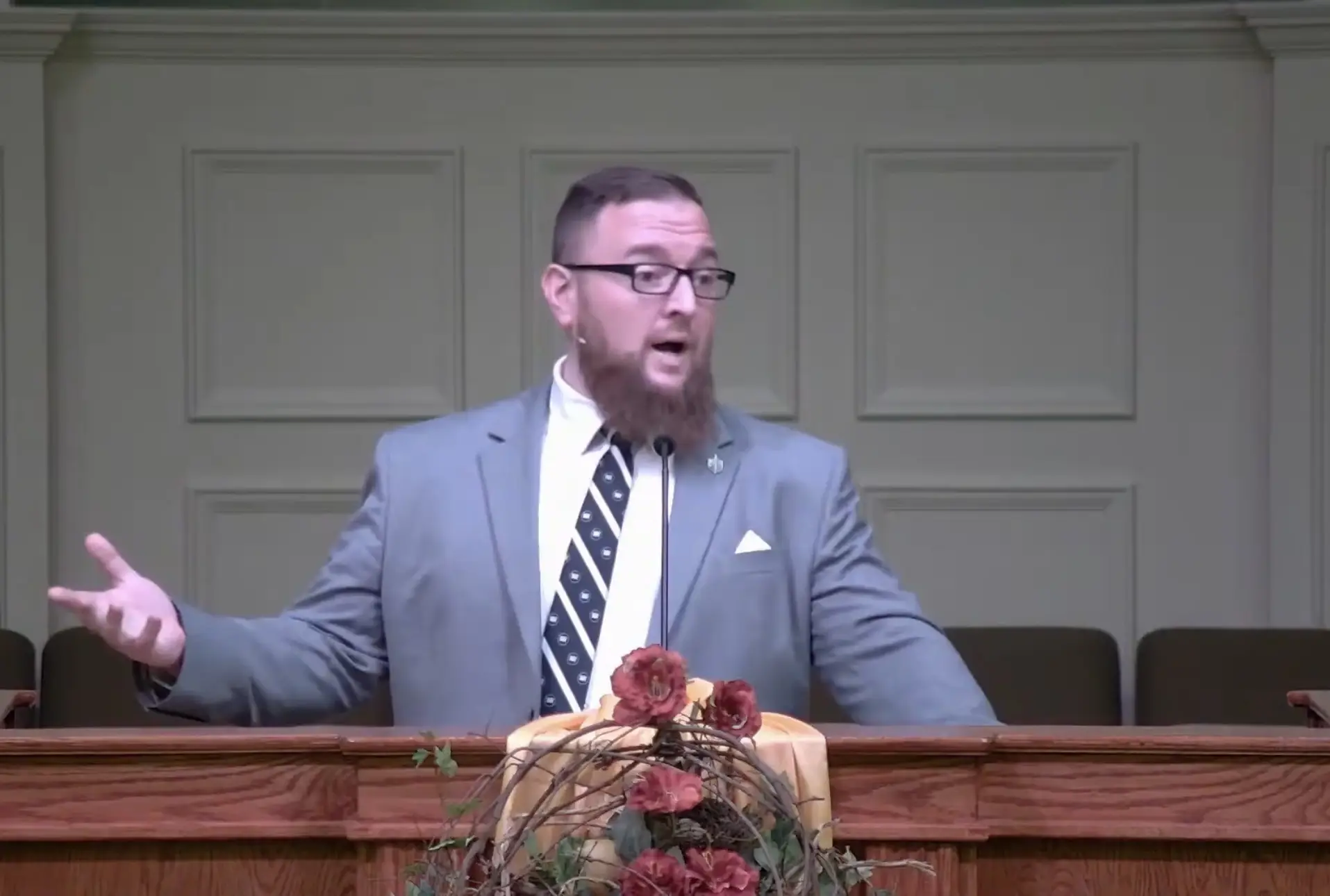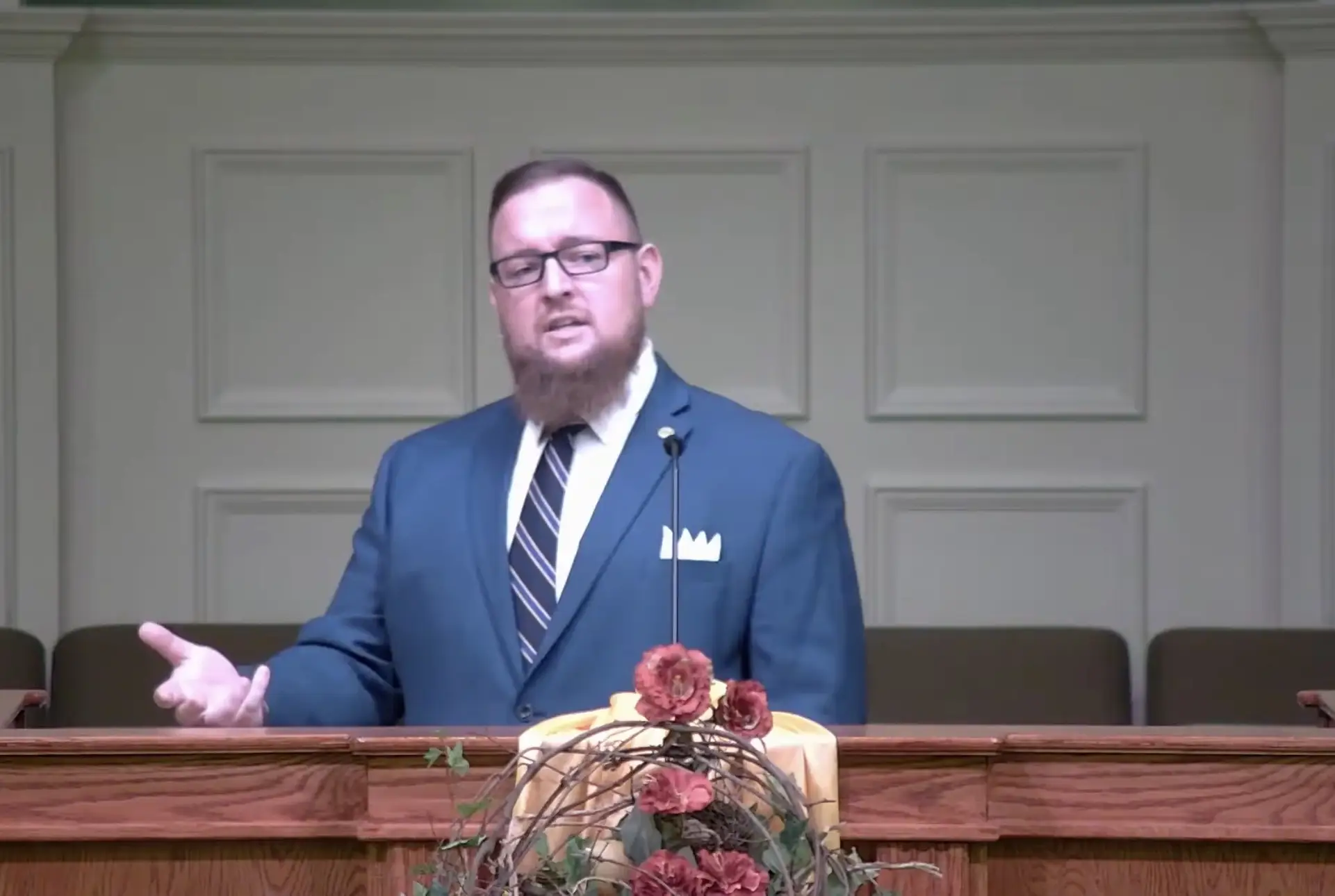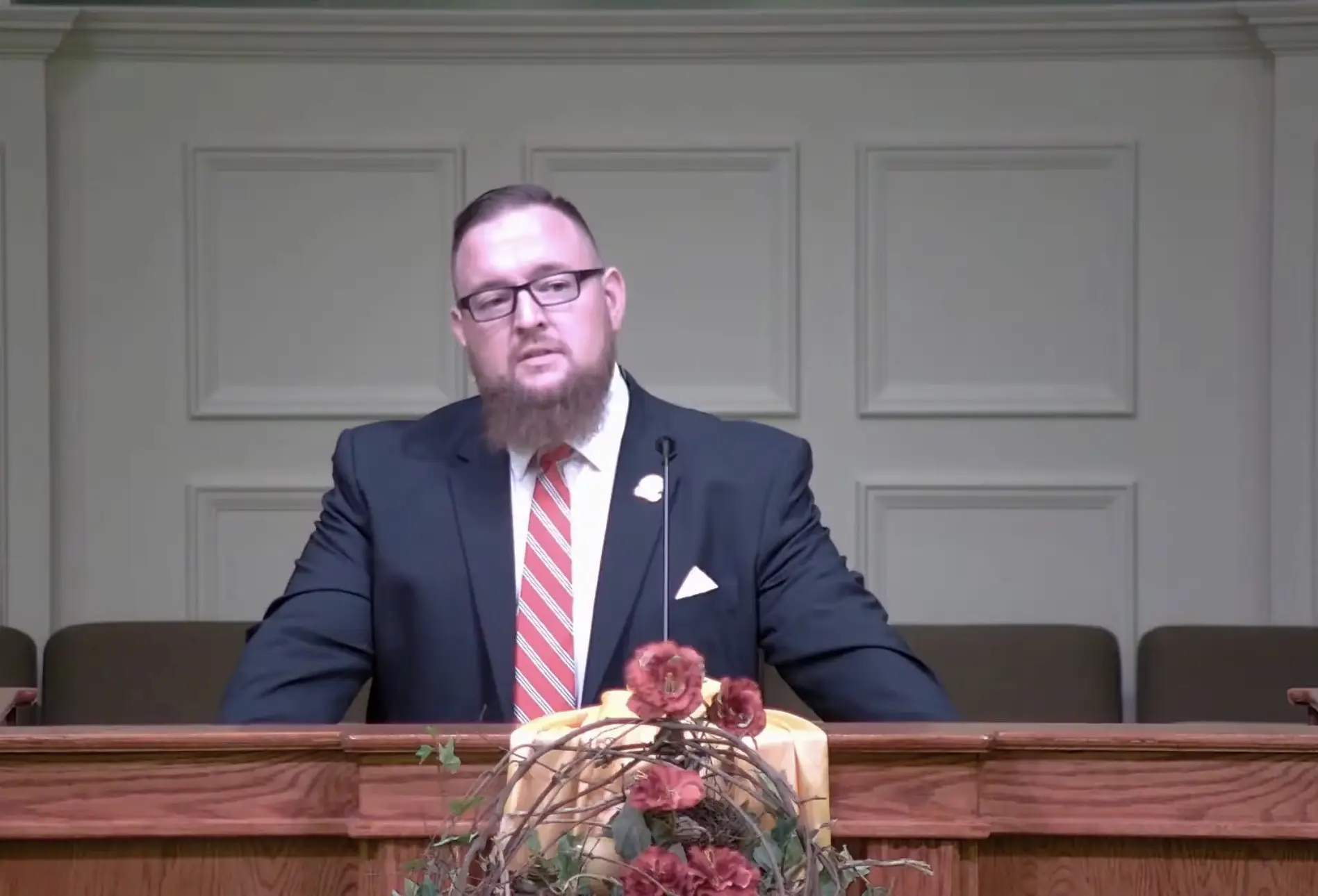Video
“He Must Increase”
John 3:22-30
Pastor Ryan J. McKeen
06/01/2025
Audio
Transcript
Well, turn with me in your Bibles to John chapter 3. John chapter 3.
It’s been a few weeks since we’ve been in John. We had the installation service a couple of weeks ago, and then I was away last week, so we are back here in John 3, and we need to do a little bit of catching up to remember where we are and what we have been talking about here in the gospel of John. Really, here in chapter 3, there’s a lot going on, really in verses 1 through 21 that we’ve already covered. John records a conversation between Jesus and the Pharisee Nicodemus. And then following that, beginning really at verse 16, we see what are probably John’s comments on what Jesus has just explained to Nicodemus. Really an explanation, a theological explanation of what Jesus means there.
And as we come today to verse 22, We’ll see a significant change in focus here in John 3. John brings us back to John the Baptist and his followers. We saw John begin the body of this gospel in chapter 1 with John. John the Baptist, and he says there was a man from John, a man who came from God whose name was John, I should say. And really, John, the author, that’s the confusing part of this part of the gospel is you kind of got to go back and forth between John the Baptist and John the apostle who wrote it, but John, the author, has explained the gospel. Really, it doesn’t take him long to really give us an in-depth explanation of how to be saved.
That’s what we’ve seen so far in John chapter 3. The comments that follow the interaction with Nicodemus explain the way of salvation. Jesus confronts Nicodemus and tells him that he must be born again. He must have a radical rebirth. And that must be done by God. He must be born from above. And we know now what Jesus demands of people. You must be born again, and not only that, you must believe. We know that He will die for His people’s sins. For salvation, to bring salvation to the ones He came for. And we see Jesus explain that just as Moses lifted up the serpent in the wilderness, even so must the Son of Man be lifted up. And we see that those who do believe in Him will have eternal life. And now that John has gotten all of that clear, now that he’s explained the theology of the gospel, the meaning behind the coming and the life and the death of Jesus, the meaning behind his writing this gospel, now that he’s done all that, he resumes the narrative account of the life of Jesus.
He goes back to this character he introduced in chapter one. John the Baptist, as we will see, continues his unwavering support of Jesus. He is still a witness to Jesus. And that’s what we find in our text this morning. The theme of this section, really, from 22 all the way through 36, the end of the chapter, is the transition from the ministry of John the Baptist to the ministry of Jesus. You could even say that the ministry of the old covenant and the transition period to the new covenant. John the Baptist was the last Old Testament prophet. We see in Luke, the Gospel of Luke, chapter 16, verse 16, Jesus says, the law and the prophets were until John. Since that time, the good news of the kingdom is proclaimed.
So there’s a shift here, a transition between John, the time of the law and the prophets that goes up until John, and then what comes after with Christ. Jesus came as the mediator of a new covenant. The book of Hebrews is largely about that. But he is a new and better priest and mediator of a new and better covenant. And this covenant was ratified. It was put into place. It was enacted by his sacrificial death. We recognize this by what we do later at the end of the service and the Lord’s Supper. And when Jesus inaugurates that covenant, as I’ll read later in 1 Corinthians 11, he says this, 1 Corinthians chapter 11 verse 25, in the same way he took the cup also after supper saying, this cup is the new covenant in my blood. Do this as often as you drink it in remembrance of me. This is a new covenant. Jesus brings something new. A change is taking place, and there’s a transition, and we see in this passage a transition from John to Jesus. Up until this point, John had enjoyed a lot of growing popularity, or at least he had it. I don’t know if he enjoyed it, but he had a lot of people coming to him.
We see more about John the Baptist in the other gospels. In fact, Mark chapter 1 begins with John the Baptist as well. Mark tells us that, starting in verse 4, John the Baptist appeared in the wilderness, preaching a baptism of repentance for the forgiveness of sins. All the region of Judea was going out to him, and all the people of Jerusalem. They were being baptized by him in the Jordan River, confessing their sins. Now that all is a generalizing term. It doesn’t mean every single individual in Judea and Jerusalem was baptized by John, but the point is that there’s a lot of people. A lot of people are following John the Baptist at this point. And on the other hand, you have Jesus, who up until now was relatively unknown. He had a few followers. The things he had done were in small gatherings. It hadn’t been long since he first called his disciples, his first disciples there in chapter one. Really from the baptism of Jesus through chapter two, it was only a matter of consecutive days. Because as we read through that, it’s, and the next day this happened, and the next day this happened. And so it’s a relatively short period of time between chapters one and two.
And we don’t know how much time passed from that to the encounter with Nicodemus, but we know it hadn’t been very long. Jesus was relatively new on the scene and didn’t have the crowds that John the Baptist had up until this point. But that’s about to change. And that’s what we see happening here in John, the end of John 3. The crowds that had been following John were now starting to go and follow Jesus. In God’s sovereign plan, John’s ministry and Jesus’ ministry overlapped. They were ministering at the same time for at least a little while. They were both ministering and it says they were both baptizing. It had to be this way. Because John had to be the forerunner who would point people to the Christ. And what we see in this passage that John explains is the exact reason why he was here.
His purpose was not just to be preaching repentance in the wilderness and baptizing people. That’s not his purpose. That was part of what he did. But his purpose, as we will see, is to point people to Jesus. And when Jesus came, He needed somebody to tell them, this is him. This is the one. And he was, John the Baptist, was prophesied to be exactly that. And as we came through chapter one, we saw these things. In chapter one, verse 23, John says, I am the voice of one crying in the wilderness, make straight the way of the Lord, as Isaiah the prophet said. He was prophesied, and John knew this. That prophecy comes from Isaiah chapter 40 verse 3, where it says there’s a voice calling, prepare the way for Yahweh in the wilderness. Make smooth in the desert a highway for our God.
That’s who John the Baptist is. That’s why he’s here. Malachi chapter 3 gives some more information in that prophecy where it says, behold, I’m going to send my messenger and he will prepare the way before me. That’s John. And the Lord whom you seek will suddenly come to his temple, and the messenger of the covenant in whom you delight. Behold, he is coming. But John and Jesus, while they ministered at the same time, they’re not rivals. They’re not rival ministers vying for different people’s attention. And that can be a temptation in ministry for ministry leaders. like Jesus and John. Sometimes ministries can get the idea that they’re competing with one another. Who can get the most people? But that’s not how it ought to be. And that is not how John or Jesus see one another. John clearly understood and accepted his lesser and yet very important role. Again, that’s what we see in our passage this morning. In verse 30 of this passage, we see John say, he must increase and I must decrease. He must increase and I must decrease.
This is the attitude that ought to be displayed in every minister of Christ, really in any disciple of Christ. Later, Jesus tells us in chapter 13 of this gospel, verse 16, “‘Truly, truly, I say to you, a slave is not greater than his master, nor is one who is sent greater than he who sent him.’” And Jesus says in Matthew chapter 23, verse 11, “‘The greatest among you shall be your servant.’” And that is exactly what we see on display in the attitude of John. He knows he is nothing more than a servant. He is there to point people to Christ. There’s a reason why Jesus said, among those born of women, there’s not arisen anyone greater than John the Baptist. That’s from Matthew chapter 11. There’s not arisen anyone greater than John the Baptist, and yet John the Baptist says, he must increase. and I must decrease. But the reason Jesus said there’s not been anyone greater wasn’t because John was a great speaker, or a great leader, or good looking, or popular, or anything like that. The reason why he’s the greatest is because this attitude we see in him, this humility, this humble posture before the one who truly deserves the attention. He must increase and I must decrease.
The passage of Scripture we’ll focus on this morning is verses 22 through 30 of John chapter 3. This is just part of the section focused on John the Baptist. We’ll continue next week. And what you really see here in this beginning part is really three sections of it. Really, you see the setting of it. John explains the context in verses 22 through 24. And then we see a challenge arise, a challenge from John’s disciples in verses 25 to 26. And then we see John’s solution. Verses 27 through 30. The setting, the challenge, and the solution. I’ll read our passage again this morning.
Verses 22 through 30 of John chapter 3. This is the word of the Lord. After these things, Jesus and his disciples came into the land of Judea, and there he was spending time with them and baptizing. And John was also baptizing in Anon near Selim, because there was much water there. And people were coming and were being baptized, for John had not yet been thrown into prison. Therefore, there arose a debate between John’s disciples and a Jew about purification. And they came to John and said to him, Rabbi, he who is with you beyond the Jordan, to whom you have borne witness, behold, he is baptizing and all are coming to him. John answered and said, a man can receive nothing unless it has been given him from heaven. You yourselves are my witnesses that I said, I am not the Christ, but I have been sent ahead of him. He who has the bride is the bridegroom, but the friend of the bridegroom who stands and hears him rejoices greatly because of the bridegroom’s voice. So this joy of mine has been made full. He must increase, but I must decrease.
What we see first here, starting in verse 22, is John setting the scene. Again, he’s transitioning from the theological explanation he’s just given us, and now in verse 22, he says, after these things, So after all of the things that have preceded, the wedding at Cana, the cleansing of the temple, the conversation with Nicodemus, after those things, although we don’t know how long after, we don’t know exactly, it’s not in the next day like it had been before, it’s just an indefinite amount of time after these things, it says they came to the land of Judea. Jesus and his disciples came to the land of Judea.
Now they were already in the region of Judea, but this is saying they went out from the cities into the countryside. They had gone out together away from the cities where they had been, where Nicodemus had come to him at night. Now they’re out in the countryside. And it says they spent some time together. This is a word that really gives no specific amount of time. It’s where we get the word diatribe from. It’s just a long period of time that they spent together, and it was an unhurried period of time. They weren’t rushing around, but Jesus was spending time with the disciples, and surely he was teaching them and getting them getting to know him better. Probably several weeks or months had passed after this interaction with Nicodemus. And it says they were baptizing. He was spending time with them and baptizing. Now we don’t read of Jesus baptizing in any other gospel. And John chapter four verse two says it actually wasn’t Jesus himself that was baptizing. It was his disciples.
So he apparently had taught them to baptize others as he was going around the countryside. And this is not the Christian baptism as we see it later on in the New Testament, where you have believers who have come to faith in Christ and then who are baptized following that. That’s not exactly the same, although it’s probably very similar in its function. This was more like a baptism of repentance, like John was doing. They were doing similar things to what John the Baptist was already doing. Preaching the kingdom of God preaching repentance and baptizing people for the forgiveness of their sins And although there’s probably some implication that they must be followers of Jesus to do this This is a different sort of a baptism. We see in verse 23 and John also was baptizing and then it gives us some Context here as far as the region where he was says he was in a non near Salim Because there was much water there and people were coming to him and being baptized.
So at the same time John was in the wilderness still Jesus had already come to John earlier and John is still in the wilderness preaching and baptizing and it says they were in a non near Salim that word that name a non means many waters and And that’s describing not only the place where they’re at, but that’s the name of the place. And the description tells us something about the mode of baptism here, because it says they were there because there was much water. They needed much water, because they needed to immerse people in it. That’s what baptized means. It means to dip, dunk, or immerse. And that’s what they were doing in much water. So you have these two ministries happening at the same time, almost identical in what they’re doing. Preaching, repentance, and baptizing.
And up until this point, John was the bigger ministry. He was the megachurch, except for with good theology. But he was the big ministry. And all the region, it says, was coming to him to be baptized. And in fact, the last two verbs in this sentence, they give the idea of a continuous action. So you could say that they kept coming to him to be baptized. They continued to come out to John to be baptized. And verse 24 says, four, John had not yet been thrown into prison. They kept coming to John because he was still ministering, he was still preaching, he was still baptizing. But there was a point where John’s ministry stopped when he is arrested. Although this gospel, John’s gospel, tells us nothing about the arrest and imprisonment of John except for this one verse. It just says he was not in prison yet. But John is not focused on telling us about John the Baptist.
John’s purpose is to tell us who Jesus is. And he gives us different witnesses to who Jesus is. So he includes this conversation from John, but doesn’t give us a lot of the explanatory details that some of the other Gospels do. And that’s what we’re seeing in this first section, the setting of this witness that we will see. This is the where and the when of what’s happening. And next we come to the challenge. We see that in verses 25 and 26. In verse 25 it says, There arose a debate between John’s disciples and a Jew about purification.
Again, this is a brief verse. It gives us some conversational context, what they were talking about. Again, this dispute about purification, we don’t know a lot about it. We don’t know exactly what they were saying, really what the dispute was over, other than it had to do with purification. but it has nothing to do with the testimony about Jesus. So John doesn’t include those details. And in fact, when John’s disciples come to John, they don’t even mention purification. But this is just a context of what they were talking about. So we’re just simply told that it happened. And we’re told this so that we’ll see the dispute comes from his disciples. The challenge comes from his disciples, not from John. This isn’t John’s idea. the reason why this disagreement comes up.
But as we see here in all this context leading up, that at some point during the ministries of John and Jesus, there was this discussion between John’s disciples and a Jew. And some versions say Jews, but really it’s singular. It’s pointing us to there was one guy, one Jewish guy who was causing a disruption with John’s disciples. It wasn’t like before when the Jews had sent men to find out who John the Baptist was. This is just, this is a smaller context. This is a smaller setting. There’s only one guy here who has this disagreement.
But even in the reaction to this by John’s disciples, you can see, they see that there’s more at stake here. There’s more on the line than just some disagreement over purification. Because notice what they immediately go to. after talking with this Jew, in verse 26. They came to John, and they said to him, Rabbi, he who was with you beyond the Jordan, to whom you have borne witness, behold, he is baptizing, and all are coming to him. So they come to their leader, their rabbi, with this problem. They’ve seen a problem on the horizon for their ministry. There’s a disruption ahead. We need to figure out what’s going on.
And Jesus is not even mentioned by name by his disciples. He’s just simply described as that man who was with you before on the other side of the Jordan, the guy that you testified about. And this may show that they were threatened by Jesus. that this competitor that they see is bad news to them. And even the last phrase here shows their bias a bit. All are coming to him. They’re panicking. John, what are we gonna do? They’re all going to him. These followers see this guy as a threat to their movement. All people weren’t going to Jesus yet. In fact, many people rejected him.
But in their exaggeration, they reveal they’re threatened by him. So they bring the problem to John. And they see what he wants to do about it. Hey, we’re losing followers here. And they’re going to that guy. What are we going to do about this, John? That’s the challenge we see from John’s disciples, John’s followers. And in verses 27 through 30, the rest of this passage we’ll look at this morning, we see John’s solution, John’s answer to their challenge. In verse 27, we see John answered and said, a man can receive nothing unless it has been given to him from heaven.
You see, unlike his followers, this didn’t bother John a bit. John was not bothered at all by his declining numbers, by losing crowd size. And while he might have been popular in the beginning, John always remained focused on his purpose. He knew from childhood what he was here for. That his purpose was to testify to the Messiah, the Christ. We see his father in Zechariah, in Luke chapter 1, tell us this much in his prophecy. Told us exactly who this boy would be and exactly who he was going to point to.
So you can be sure that John’s dad mentioned to him a few times what he’s here for. what he would be called to do. And so John had no doubt why he was here. John was just a man like any one of us, but he was a man who believed God’s word. And he was a man who was chosen for a purpose, and he knew what that purpose was. He had no doubt why he was here. And as his ministry began to decrease, As his importance and his relevance began to decrease, he knew that his purpose didn’t change.
He didn’t think he needed to retool his ministry to try to reach the young folks. He didn’t think he needed to become more seeker-sensitive. He didn’t need to figure out how to draw more and bigger crowds. His purpose was clear. He was here to point people to Jesus. And his self-sacrificing reply probably shocked his disciples. John has what God gave him. And that’s it. John has the ministry God gave him. He has the people God gave him. He has the crowds God gave him. He has that and no more. He is the forerunner. He cannot be anything more than the forerunner, because God’s Word said so. God hadn’t given it to him to interfere with the ministry of the Christ.
So if people were flocking to Jesus, that’s because the Father willed that to be. And that is the way ministry ought to be. That no man has anything except what comes to him from God. I remember John MacArthur in class one time telling us, he’s speaking to a bunch of pastors in class and he says to us, you worry about the depth of your ministry and you let God worry about the breadth of it. And what he means is, you worry about preaching the text, about preaching Christ, and you let God worry about the size of your ministry. Or to put it another way, you fill the pulpit and let God fill the church. And that is the attitude we see here in John the Baptist. And it ought to be the attitude of every ministry.
It’s not about the numbers. It’s not about the crowds. It’s not about the reach. It’s about Him. It’s about pointing people to Him. It’s not your ministry, it’s His. A man can receive nothing unless it has been given to him from heaven. And these words also apply to every believer. It applies to your salvation. Every gift you receive from God, it could have never been gained otherwise, other than that he gave it to you.
We saw this when Jesus talked to Nicodemus, that you must be born again. You must be born from above. and you have as much to do with your second birth as you did with your first. It’s not about what you do or don’t do or what you earn. It’s simply receiving what he’s given to you. A man can receive nothing unless it’s been given to him from heaven.
And verse 28 continues, and you yourselves are my witnesses. that I said, I am not the Christ, but I have been sent ahead of him. This is a rebuke from a rabbi. He’s saying, I told you this, and you weren’t listening. I already told you that I’m not the Christ. Who were you really after? Success in ministry is not about how many people follow the minister. It’s about how many people are following Christ. That’s the goal. And this was the problem in the church at Corinth. You go to 1 Corinthians chapter one, this is exactly what Paul’s dealing with. And he says in verse 12, Now I mean this, that each one of you is saying, I am of Paul, I am of Apollos, I am of Cephas, I am of Christ. That’s exactly what we see with John and his followers. They’re saying, I am of John, who is this guy? They’re all going to him, we gotta do something about this. And John was having none of it. I told you. I told you I’m not the Christ.
Paul continues the next verse, verse 13 in 1 Corinthians 1. Has Christ been divided? Was Paul crucified for you? Or were you baptized in the name of Paul? Paul says, it’s not about me. It’s about Christ. And that’s what John’s saying to his followers. I’ve told you I’m not the Christ. We saw John say this several times already. In the prologue, the author John explains in verses six through eight of chapter one, there was a man having been sent from God whose name was John. He came as a witness to bear witness about the light so that all might believe through him. He was not the light, but he came to bear witness about the light. He was merely a reflection pointing you to the light.
In verse 20 of chapter 1, John says he confessed and he did not deny, but he confessed. I am not the Christ. He was very clear. Don’t get it mixed up. I’m not the Christ. And then when he meets the Christ, he tells them, that’s the Son of God. Behold the Lamb of God. Meaning, you should be following him. And now later on, his disciples are like, hey, they’re following him. Good, exactly. That’s the point. John was very clear that he was not the Christ. Why wouldn’t Jesus be drawing bigger crowds? It makes perfect sense. Didn’t they get it?
And this seems silly when we read it like this, but I think this can be a challenge for us as well. Who are you really after? Why do you come to church on Sunday? Do you come to church to see certain people? Or do you come to make an appearance so the pastor won’t bother you about not being there on Sunday? Do you come because you’re supposed to? Or do you come because you want more of him? Why do you read your Bible? Why do you memorize scripture? Why do you pray? Why do you do any of the things that Christians are supposed to do? The reason we’re told to do those things is not so that we’ll be good Christians. We do them so that we have more of Him.
Why do you keep His commandments? Why do you obey His word? Is it because you love Him? Is it because you want to know more of Him? Is it because you want to grow in the grace and the knowledge of the Lord Jesus Christ? Who are you really after? You see, the Christian life, the life of a disciple, it isn’t about what you do and what you don’t do. It isn’t about checking boxes or marking off lists of things you’ve done. It’s about Jesus Christ. It’s about growing to know him more. It’s about growing to be more like him. Who are you after? John continues in verse 29 with an illustration. He says, he who has the bride is the bridegroom, but the friend of the bridegroom who stands and hears him rejoices greatly. because of the bridegroom’s voice. So this joy of mine has been made full.”
So John gives us here a short one-verse illustration, or parable, if you will. And in this illustration, John says, I am not the bridegroom. But rather, he’s the friend of the bridegroom, or we would say the best man. And this makes good sense to us, but it makes even more sense when you understand the context that they’re in. Because in those days, the best man, he oversaw the details of the wedding. He served as the master of ceremonies. And the bridegroom and the best man have completely different roles. And John knows his role. And not only that, but there are historical accounts that tell us in those ancient times, when someone was named the best man, no matter what happened, he was legally forbidden from marrying that bride.
D.A. Carson points out in his commentary, he said, there’s good evidence that in ancient Sumerian and Babylon law, that the best man was absolutely prohibited from marrying the bride. And this influence of this view in the Old Testament period is traced through Judges 14 and 15 in Samson.
Because if you remember the story of Samson, Samson has a riddle. And he’s tricked by his fiance to give up the riddle. And so when they figure it out and he has to go kill 30 Philistines for their change of clothes, then that whole episode happens. Well, he goes home and then he comes back for his bride. And what happened? The best man married the bride. And even the Philistines knew that was wrong. Because you don’t do that. The best man is forbidden from that bride.
And so John the Baptist is saying in this illustration, he is the last one that would take the bride. He is the last man on earth who would compete with this bridegroom. Because under no circumstances was John the Messiah. He was not the bridegroom. His job was to bring the bride to the bridegroom. His job was to make sure the wedding was going to take place and to point people to what was happening. And now that he’d done his job, his job is complete. And the focus should be shifted from the best man to the bridegroom. And unlike his followers who were jealous, of the attention that Jesus was getting by all who were coming to him, John says that he is overjoyed that this is happening.
John couldn’t be happier to see people walking away and following Jesus. This joy of mine has been made full. This is exactly what John was here for. This is why he’s here. He’s the forerunner. He’s the one pointing to the Christ. And people got him. They heard him. They saw and they followed the Christ. Why would he be upset or jealous that the purpose for which he came has been fulfilled? And then John gives us this profound statement in verse 30. He must increase. but I must decrease. This is what it’s all about. This is what the Christian life is about. This is what it means to grow in Christ likeness. Christ must grow in your life and you must shrink. He must increase and I must decrease.
This must happen. John uses that word must quite a bit. The Bible uses the word must to speak about things that must happen. And the reason these things must happen is because that’s how God told us in his word it would happen. And God doesn’t make predictions. God states facts. And when we see prophecies that God has given us, they’re not predictions of how he thinks the future will be. They are telling us exactly how God will work out the future.
And we see earlier in this chapter, Jesus’ gospel statement. And he said this must take place. He said in verses 14 and 15, as Moses lifted up the serpent in the wilderness, even so must the Son of Man be lifted up. It must happen. He must be lifted up. He had to come to earth to be born as a man. He had to live perfectly, a perfectly sinless life. He had to obey the father perfectly in his humanity. And he had to give his life in the brutal death on the cross in the place of sinners. But he also had to rise again. And he had to ascend to the right hand of the Father. And the Bible tells us he will return. He will return one day for his people and to judge the world.
These things must happen because God said it will. You must believe these things to be saved. You must trust him as your savior, as your substitute on that cross. And if you do, you will live forever with him. But in order for that to happen, in order for you to truly believe and trust in him, you have to humble yourself. You have to admit your own sinfulness and your need of a Savior. He must increase, and I must decrease. That happens when we even come to Him. He must increase, and I must necessarily decrease. That is the humble attitude we must bring to the cross. And it’s the humble attitude we must bring to the Lord’s table this morning as we remember His sacrifice until He comes again. He must increase and I must decrease.
Let’s stand and close in a word of prayer this morning. our God in heaven, we are humbled by such a statement. We are convicted by such a statement. We see a man like John who understood his role, his purpose, to point people to Christ. We pray, Lord, that we would not have that attitude or spirit of jealousy and pride within us, but that we would look to Christ and see that he must increase and we must decrease. And as we come to your table this morning, show us the sin in our hearts. Allow us repentance. Help us to come humbly before the table as we seek to remember the sacrifice that Christ made for us. God, we thank you. We praise you. We give you all the glory because none of it can come to us. We pray that in each of our lives that that would be true, that he would increase and that each one of us would decrease. We pray all these things in Christ’s precious name. Amen.
